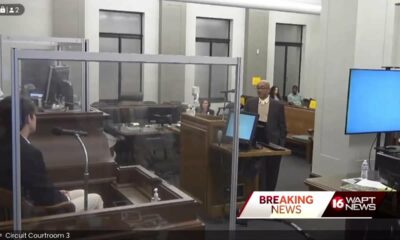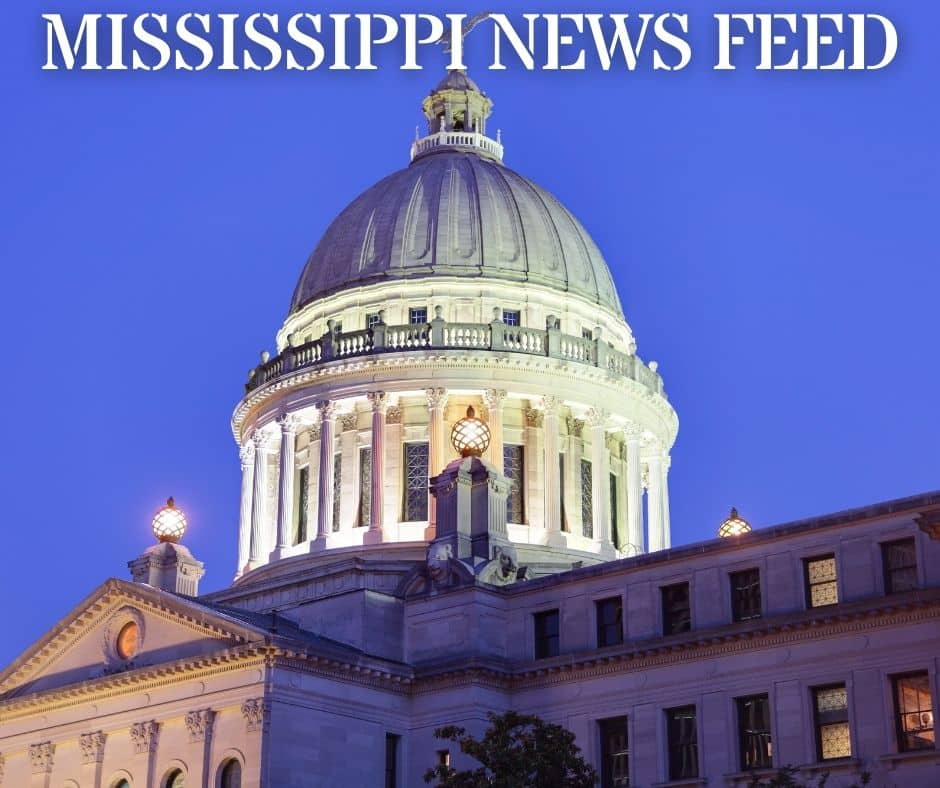Magnolia Tribune
Experts have serious concerns about Mississippi’s public defender system
Experts suggest Mississippi is failing to satisfy its Sixth Amendment duty to provide access to counsel for indigent defendants, costing counties millions and putting the civil rights of thousands in jeopardy.
Andre de Gruy speaks rapidly. The Louisiana native turned Mississippi son is a man on a mission to change the world, or at least his home state. For the last eight years, he’s served as State Public Defender.
His journey in representing the interest of people who often lack advocates goes back further.
In 2001, de Gruy founded the Office of Capital Defense Counsel, where he served to ensure people facing the ultimate punishment were not deprived of an adequate defense.

People like de Gruy fill thankless voids in the justice system. It is easy to dismiss someone accused of a crime as bad, or to assume guilt. Giving aid to people in that position does not always make a lawyer popular.
But in any system where the government has the ability to deprive someone of their liberty, or even their life, access to qualified counsel is important to ensuring a fair trial and that the evidence supports the accusation, according to de Gruy.
“It’s a government responsibility, it’s a function of government, that we have to provide lawyers and that should be done like any other government service in the most efficient and effective way as possible,” de Gruy explained. “That’s why it’s important to include indigent defense in any criminal justice reform, it’s a constitutional mandate.”
Scott Peyton, the Mississippi Director for Right on Crime, agrees with de Gruy. He told Magnolia Tribune that public defenders ensure that the fundamental due process principle of “innocent until proven guilty” applies to every Mississippian, not only those who can afford to finance their own defense.
Mississippi’s Decentralized System
To a large degree, de Gruy’s hands are tied.
The Sixth Amendment to the United States Constitution creates a right to the assistance of counsel for any one charged with a crime. In the 1963 case of Gideon v. Wainwright, the U.S. Supreme Court held that the Sixth Amendment requires states to provide attorneys to criminal defendants who cannot otherwise afford one.
Mississippi created the State Public Defender office in 2011, but much of the responsibility for ensuring the constitutional right to counsel is satisfied falls on local courts. This is because Mississippi’s system for providing an attorney is much more decentralized than other states. Public defenders here are largely appointed directly by the local courts in which they practice.
David Carroll, Executive Director of the Sixth Amendment Center, said the Fourteenth Amendment to the U.S. Constitution obligates states, not local governments, to ensure effective representation under the Sixth Amendment.
“And that’s the big glaring thing, there is no structure in Mississippi state government to provide oversight, set standards, and figure out if the counties and municipalities are in fact meeting the Sixth Amendment or not,” explained Carroll. He referenced a 2018 Sixth Amendment Center Report, that found that many of the counties and municipalities are not meeting their constitutional requirements.
“I don’t want to make it seem like all of Mississippi is bleak, but the trial level in particular is very very problematic,” Carroll said. “When you look at neighboring states, I think you’re going to find a significant difference in what’s happening in other states versus what’s happening in Mississippi.”
Surrounding States
De Gruy explains that in Mississippi, neither the funding for, nor the provision of public defenders, is centralized. Jurisdictions all have their own idiosyncrasies.
The four surrounding states all deliver services differently: Arkansas has a public defender commission that employs all defenders and staff and provides for conflict counsel with 100% state funding. Tennessee elects public defenders and has near 100% state funding (two counties maintain offices that existed at time of their reforms), such that the public defender system mirrors the system for prosecutors. Alabama has 100% state funding administered through their Department of Finance and Administration, with local advisory boards.
He points to our surrounding states as examples of more unified systems. “When you look at our surrounding states, the main difference is with the funding is primarily, or at least 50% state funding and the rest local funding, and there’s state level standards or oversight so there’s more of a consistency across those states as to what kind of representation,” de Gruy said.
“Alabama and Arkansas, the main difference is they are 100% state funded. Now some of the funds may come from fees, but to me it’s all state money, it’s all tax dollars, it’s all public funds regardless of whether it comes through taxes or not,” de Gruy said. “Those two systems are 100% state funded systems and Arkansas, they have district defender offices just like district attorney offices and then they have a central office that’s governed by a board of director that’s appointed, I think, by the Governor.”
“When you look at our surrounding states, the main difference is with the funding. It’s primarily, or at least 50%, state funding. There’s state level standards or oversight, so there’s more of a consistency across those states,” de Gruy explained. Another key factor is how public defenders are selected to serve.
Arkansas has a public defender commission that employs all defenders and staff and provides for conflict counsel with 100% state funding. Tennessee elects public defenders, the same way prosecutors are elected. It has near 100% state funding. Alabama has 100% state funding administered through their Department of Finance and Administration, with local advisory boards.
Deficiencies in the System
The Sixth Amendment Center’s report identified a number of deficiencies in Mississippi’s current system. One perceived fault is that it creates dual loyalty for an attorney. Attorneys are obligated to provide a zealous defense to their client’s interest. In a system where the presiding judge appoints the attorney, that attorney may be disinclined to push the envelope for their client for fear of getting on the court’s bad side and risking future appointments.
The Sixth Amendment Center also contends that payment structures provide disincentive for lawyers to put in the work necessary to offer effective assistance to their clients. With limited payment for their work, the incentive to attorneys is to not spend too much time on their clients cases, and instead to take on a higher volume of cases.
“Because it’s all pushed down to local governments, and local governments have different revenue bases and needs and number of people qualifying, most of the poor counties choose what is called a flat fee contract model, in which the court or the county will contract with a private defense attorney and say ‘you handle all the cases in my court room.’ The problem with that is it incentives the lawyer to do as little work on the case as possible,” Carroll explained.
“If you’re being paid the same amount whether you put a lot of effort into the case or as little as possible, not that every lawyer will make this choice, but there will be lawyers that make a choice to pocket as much money by getting rid of cases as quickly as possible.”
In 2018, at the time the report was published, only seven of Mississippi’s 82 counties had established full-time public defender offices. Only 12 counties in the state provide representation to indigent felony defendants exclusively through appointed private attorneys who are paid an hourly rate.
The “Dead Zone”
Another problem that has appeared within the public defender system is a gap in representation between the time of preliminary hearing and indictment. Cliff Johnson of the MacArthur Justice Institute coined this period as the “dead zone.”
The impact of the dead zone is that people sit in jail for extended periods of time before being indicted with no access to counsel. MacArthur released a study last year that found there were more than 5,800 people incarcerated in Mississippi’s county jails. 2,716 of those detainees have been in jail longer than 90 days. More than 1,000 have been detained at least nine months. 731 have been stuck in county jail over a year.

One example MacArthur points to is Duane Lake. Lake was arrested in 2015 for a double homicide–an obviously serious offense. He sat in jail for two years without access to counsel while he awaited an indictment. His trial did not occur until 2021, at which time he was acquitted of the charges and released. But Lake had spent a total of six years in jail by the time he had his day in court. In the meantime, he lost his wife and his job.
MacArthur has estimated that the total annual cost to counties for incarcerating individuals pre-trial is over $90 million, a figure which they believe could be dramatically reduced by giving people access to counsel to fight for reduced bail and push for the speedy trials guaranteed under the Sixth Amendment.
On April 13, 2023, the Mississippi Supreme Court approved a new rule of criminal procedure that requires that an indigent defendant have access to continuous representation criminal defendants who can’t afford their own attorney must always have one before an indictment.
While the rule creates a mandate, both Carroll and Right on Crime’s Scott Peyton expressed concern about implementation.
“To ensure justice, and prevent unnecessary costs, Mississippi must adequately fund the public defender system to ensure that it operates with the necessary bandwidth, training, and resources,” Peyton continued. “Inadequate support and training leads to what we are facing in Mississippi today, defendants languishing in jails for prolonged periods of time. This does little to support public safety.”
Carroll said without any state agency spot-checking against standards, his guess is that there won’t be a lot of change until counties and municipalities are forced to deal with the rule change.
“Next Step” Plan for the Mississippi Public Defender System
In 2015, a task force was created by the Legislature to examine Mississippi’s Public Defender system. The task force worked closely with the Sixth Amendment Center for three years. In 2018, it released a Final Report and Recommendations for the Legislature.
The Task Force recommended a stronger state-level body that can set objective standards and monitor local public defenders to ensure compliance. For this purpose, they suggested the creation of a commission. For selection of public defenders, they recommended a move away from court appointed defenders to a “district defender” model that would mirror each circuit court’s district attorney office. Finally, they suggested that the state and local governments share the cost of the public defender system.
To date, the Legislature has not heeded any of these recommendations. De Gruy says that the Office of State Public Defender continues to support the recommendations of the task force, but he’s taking baby steps given the Legislature’s reluctance.
The OSPD submitted a plan as the “next step” in development of a statewide public defender system to ensure Constitutional compliance in a fiscally efficient manner.
“This proposal differs from the Mississippi Public Defender Task Force proposal and Sixth Amendment Center recommendations in three significant ways. It does NOT establish a state commission, create district defender offices, nor amend existing statutory authorizations for county public defender offices,” the plan states.
“We believe that a more modest “next step” is more feasible,” the plan continued.
The submitted proposal for “next steps” would allow OSPD to provide representation in any matter in which there is a constitutional right to counsel and tasks OSPD with promulgating practice standards subject to approval by the Supreme Court.
“We think the next step is to get statewide standards and we’ve been pushing this for a few years in the Legislature,” de Gruy said. “This past year in H.B. 840, we had a really simple change to the OSPD authority. We were asking for a change that would allow us to help in cases beyond the death penalty cases.”
“We passed 115-0 in the House and we didn’t make it out of committee in the Senate, so we’ve got work to do on the Senate side next session,” de Gruy continued.
Disclaimer: Russ Latino, founder of the Magnolia Tribune Institute, filed the motion with the Mississippi Supreme Court to change the rules of criminal procedure to ensure that criminal defendants had continuity of representation. In April, the Court adopted the rule.
The post Experts have serious concerns about Mississippi’s public defender system appeared first on Magnolia Tribune.
…
By: Anne Summerhays
Title: Experts have serious concerns about Mississippi’s public defender system
Sourced From: magnoliatribune.com/2023/05/23/expert-have-serious-concerns-about-mississippis-public-defender-system/?utm_source=rss&utm_medium=rss&utm_campaign=expert-have-serious-concerns-about-mississippis-public-defender-system
Published Date: Tue, 23 May 2023 13:58:56 +0000
Magnolia Tribune
Staring mortality in the face at Christmas
My friend Jarrod is dying after an eight year battle with cancer. He’s lived a life worth celebrating, one that has drawn people to Christ.
I was going about my business this week when I received a text that stopped me in my tracks. A college friend was being moved to hospice care.
Jarrod Egley was diagnosed with colorectal cancer in early 2017. In the fall of 2018, tests revealed the cancer had spread to his lungs and Jarrod’s cancer was classified as Stage IV.
For almost eight years from the date of the original diagnosis, he’s fought. Through surgeries, radiation, endless rounds and cycles of chemotherapy, and experimental immunotherapies, he’s fought.

Last year, I flew out to California and spent some time with Jarrod and his wife, Emily. We sat outside one night. He acknowledged to me that it was not a question of ‘if’, but ‘when’ the cancer would claim his life. I told him I was sorry, because what else is there to say?
We talked about our faith, about the trials of Job, about Jacob wrestling with God, about Paul’s affliction. But mostly we reflected on our time together in school, on the good things, and the mundane things, that happened since.
Jarrod and I met at Tulane University. One Sunday morning in the Spring of my freshman year, I rose from my dorm room bed, dressed, and began walking down Saint Charles Avenue in New Orleans with no particular agenda. I walked until I came across First Baptist Church and the thought flickered in the vacuous recesses of my brain to enter.
Some would say it was a lark. The Calvinist in me says providence. The walk that morning changed the trajectory of my time at Tulane and my life on the whole. Intervarsity Christian Fellowship and the Baptist Collegiate Ministry became central to my life and put me in regular league with Jarrod. I met him first at the BCM and we ultimately ended up attending church together.
Jarrod was a faithful servant on and off campus. He helped organize a group of us that would weekly make our way down to the Esplanade seawall on the backside of the French Quarter to feed the homeless. On Friday nights, he could be found at chapel with a small cadre of students foregoing Bourbon Street for early 2000s worship music.
Jarrod was a loyal friend in those years. Never rude or biting. Not prone to an insult for an easy laugh. Persistently encouraging. An engineering student, his mind worked linearly and was oriented to problem solving. There were never a lot of wasted words — always a lot of deliberative questions when he disagreed or did not understand a point. He exhibited intelligence, empathy, and the kind of moral conviction that sets someone apart.
He also had a wry and dry sense of humor and a penchant for beating people at Madden football. He was fair-to-midland on the ultimate frisbee pitch. Along the way, there were crawfish boils, Mardi Gras outtings, poorly attended Tulane football games, and more than a decent amount of wing eating.
After college, I lost touch with Jarrod. He moved back to his home state of California. He got married to his college sweetheart, who could not have anticipated her husband’s journey, but has been a steady and constant helpmate throughout. Jarrod became a very successful engineer and a bourbon connoisseur. One of his bucket list trips took him to Kentucky, where he got to meet and became friends with bourbon “Hall of Famer” Freddie Johnson of Buffalo Trace acclaim.

Sitting in his backyard nearly 20 years after graduating from Tulane, I saw many of the same qualities I had grown to admire when we were students together. I saw a husband who doted on and supported Emily’s passions. But I also saw someone whose body had been beaten to hell and back, who was tired, and who, like Jacob, had been wrestling with God. We quickly fell back into friendship, which perhaps is the mark of good friendship.
We all have aspirations in our youth — for the kind of spouse or parent we might be, for what we might accomplish, for what we might experience. Along the way, dreams are satisfied, modified, or they die on the vine. The clock inevitably works against all of us. That night in Oceanside, California, Jarrod, a numbers guy, saw that time was not on his side. He believed, as we all would, that he still had more to give, more impact to be made, and more things to see and experience.
After that trip, Jarrod and I stayed in touch, most frequently triggered by news of his cancer. It has been mostly the bad variety in recent months. Now spread throughout his body, down to his bones, he has lived in constant pain for months. Not even a steady diet of morphine and an implanted pain pump solve for it. Jarrod’s been hospitalized twelve times just in 2023.
But his matter of fact sense of humor and way of seeing the world remains in tact. So too does his faith that despite these trials, he has always been safe in the hands of Christ.
There are people in the world who believe that life is random, disordered, and without reason. I am not among them. I think my friend is staring mortality in the face at Christmas for a reason.
For thousands of years before Christ came, there was darkness and despair. Sin and shame gripped the hearts of men. Until one holy night, God, in His infinite love, mercy and wisdom, sent His son to save. Jesus is the light of the world and the hope of man. He has won victory over death and Jarrod’s will not be the exception. Jesus came for Jarrod, and for you.
For thousands of years since Jesus’s death, burial, and resurrection, His disciples have been used as divine instruments to point the way to God. Jarrod is among them. If life expectancies were the measure, Jarrod would be at the midway point for most people. He’s made a lifetime of impact for the Kingdom and on other people.
So, to my friend Jarrod, you were placed here with a purpose. You have run your race. You are loved. And when this chapter closes, you will hear “well done, my good and faithful servant.” There is no greater evidence of a life well lived.
While Jarrod and Emily have been fortunate to have health insurance, their portion of the medical bills so far in 2023 have eclipsed $30,000, and Emily is facing additional uncovered expenses during Jarrod’s hospice care, including a night nurse that costs over $400 a night. If you would like to help defray the cost, a contribution can be made at their Go Fund Me page.
The post Staring mortality in the face at Christmas appeared first on Magnolia Tribune.
…
By: Russ Latino
Title: Staring mortality in the face at Christmas
Sourced From: magnoliatribune.com/2023/12/16/staring-mortality-in-the-face-at-christmas/?utm_source=rss&utm_medium=rss&utm_campaign=staring-mortality-in-the-face-at-christmas
Published Date: Sat, 16 Dec 2023 15:05:22 +0000
Did you miss our previous article…
https://www.biloxinewsevents.com/magnolia-mornings-december-15-2023/
Magnolia Tribune
Magnolia Mornings: December 15, 2023
Important state and national stories, market and business news, sports and entertainment, delivered in quick-hit fashion to start your day informed.
In Mississippi
1. Laurin St. Pe’ named CEO of Singing River Health System
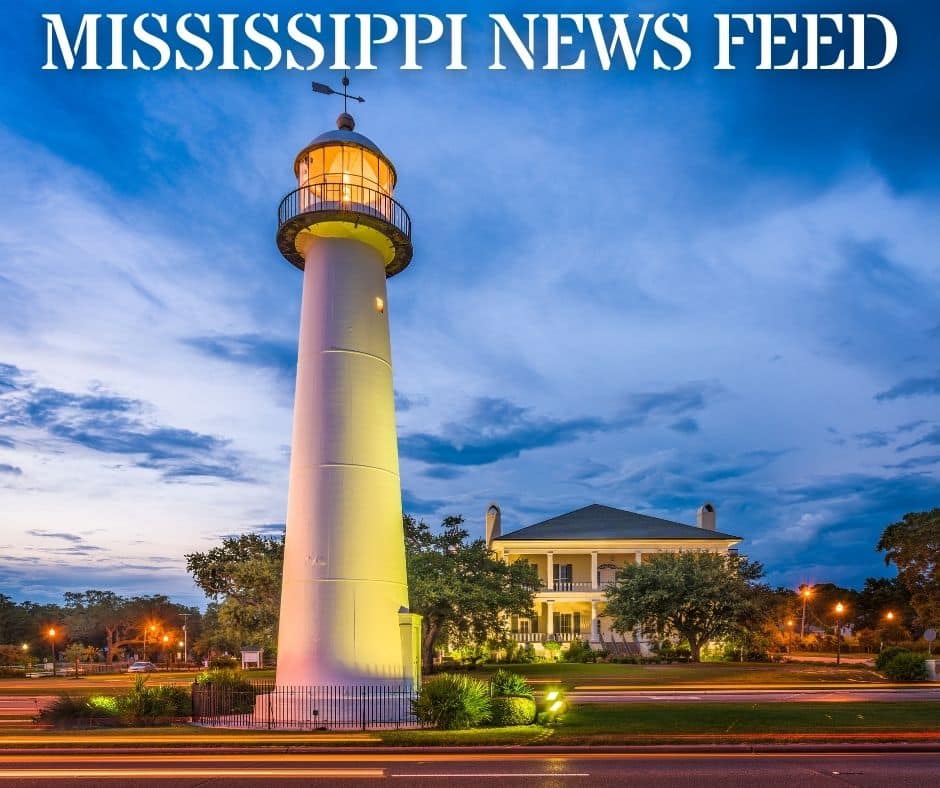
The Board of Trustees of Singing River Health System announced the immediate appointment of Laurin St. Pe’ as the Chief Executive Officer on Thursday.
“We are thrilled to announce Laurin St. Pe as the new CEO of Singing River,” said Steve Ates, Board President in a statement. “His wealth of healthcare experience and proven track record make him the ideal leader to steer our health system toward its next phase of growth and success.”
St. Pe’, who has been serving as Interim CEO since July 2023, said he is honored to assume the role of CEO at Singing River. He has worked at Singing River as Administrator of Singing River Health System’s Pascagoula Hospital and Gulfport Hospital, in addition to overseeing program service lines throughout the entire system to his subsequent appointment as Chief Operating Officer of Singing River.
The health system says St. Pe played a crucial role in the financial revitalization of Singing River Health System while steering the organization toward financial stability.
2. Gulfport-Biloxi airport, Stennis evacuated after threats
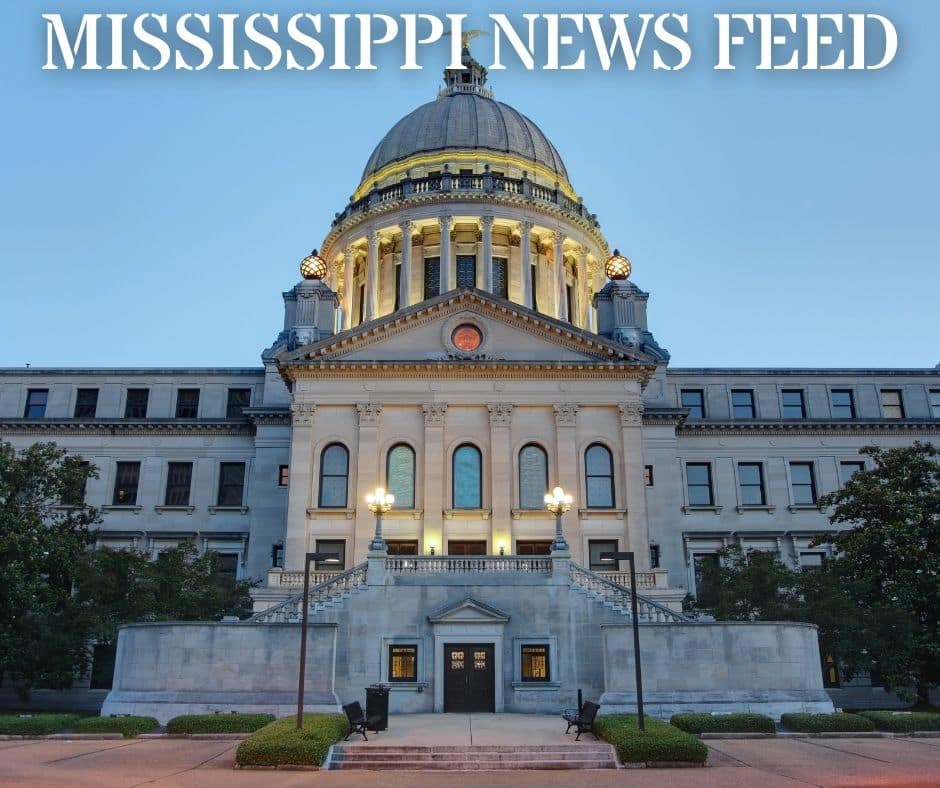
The Gulfport-Biloxi International Airport was evacuated on Thursday morning “out of an abundance of caution,” airport officials said, after receiving an emailed threat to certain transportation entities across the state.
The airport was thoroughly security swept, cleared and reopened in just over two hours. Gulfport-Biloxi is now operating regularly.
The threat was also sent to Stennis International Airport. Their staff and personnel were also evacuated until the facilities could be swept and cleared.
Any passenger whose travel was affected by the evacuation is encouraged to contact their respective air carrier.
3. Cassidy arrested in Iowa for beheading Satanic Temple statue
Former Mississippi congressional and legislative candidate Michael Cassidy was arrested this week in Iowa for beheading a statue at the state’s Capitol erected by The Satanic Temple.
Cassidy reportedly decapitated the statue and turned himself to police on Thursday. He was charged with fourth degree criminal mischief. He then started an online legal defense fund where he’s raised upwards of $20,000 as of Thursday night, according to his X account.
4. “Serial fraudster” ordered to cease offering investments into companies
According to the Mississippi Secretary of State’s office, on October 26, 2023, Secretary Michael Watson and the Securities Division issued an order against Stephone N. Patton. The SOS says Patton is a serial fraudster with multiple criminal convictions in Mississippi and Florida.
Through business filings with the SEC and Mississippi, Patton has held himself to be the CEO of various companies, including Star Oil and Gas Company, Inc., North Gulf Energy Corporation, Inc., Patton Oilfield Services, Inc., and Patton Farms, LLC.
The SOS says using these business filings and company websites, Patton claimed to have raised hundreds of billions of dollars through investment opportunities. Through investigative efforts and collaboration with the SEC, the SOS discovered none of Patton’s companies are operational, have any assets, or generate any revenues. Account records show Patton spent investors’ funds almost as soon as he received them on personal expenses. The total amount of known investments made to Patton’s fraudulent companies is over $80,000. Further, none of Patton’s investment offerings have been registered or notice filed with the Mississippi Secretary of State’s Office.
The SOS order requires Patton to cease and desist from offering investments with his companies, requiring Patton to permanently deactivate his companies’ websites to prevent any further dissemination of his false or misleading information. Patton is also ordered to pay an administrative penalty of $25,000 to the Mississippi Secretary of State’s Office for these violations, in addition to restitution owed to all his Mississippi investors.
National News & Foreign Policy
1. Congressional retirements mounting as 2024 election cycle nears
Retirement and departure announcements are piling up ahead of the start to the 2024 election cycle. The New York Times has developed a Retirement Tracker that currently shows 22 Democrats and 11 Republicans who are in Congress now will not be seeking re-election next year.
“Dozens of members of Congress have announced plans to leave their seats in the House of Representatives, setting a rapid pace for congressional departures, with more expected as the 2024 election draws closer,” the NY Times reports. “Given Republicans’ razor-thin House majority, the wave of exits has the potential to lead to a significant shake-up next year.”
You can find the tracker here.
2. Texas, Daily Wire, The Federalist sue U.S. State Department over media censorship

The U.S. State Department’s Global Engagement Center has come under fire as Texas Attorney General Ken Paxton along with The Daily Wire and The Federalist have filed a federal lawsuit alleging that the department funded technology that could “render disfavored press outlets unprofitable.” They claim that the department has helped social media – Facebook, YouTube and X (formerly Twitter) – to censor free speech while funding technologies used to censor right-leaning news outlets such as theirs.
New Civil Liberties Alliance is representing The Daily Wire and The Federalist. Paxton and the outlets claim the Global Disinformation Index (GDI), a British think tank, received a $100,000 grant from the State Department in 2021, and NewsGuard, which rates the “misinformation” levels of news outlets, received $25,000 from the State Department in 2020, according to the lawsuit.
According to the State Department’s website, the Global Engagement Center’s mission is to direct, lead, synchronize, integrate, and coordinate U.S. Federal Government efforts to recognize, understand, expose, and counter foreign state and non-state propaganda and disinformation efforts aimed at undermining or influencing the policies, security, or stability of the United States, its allies, and partner nations.
As reported by Reuters, the lawsuit cited a GDI-produced list from December 2022 that ranked The Daily Wire and The Federalist as among the 10 “riskiest sites” for news while the least-risky included The New York Times, Associated Press and NPR. Reuters notes that the lawsuit alleges such “blacklists” are reducing revenues to The Daily Wire and The Federalist along with their visibility on social media and ranking results from browser searches.
Sports & Entertainment
1. SEC releases 2024 schedules

Wednesday evening, the Southeastern Conference released the 2024 football schedules for its member schools, including of interest in the Magnolia State the schedules for Ole Miss and Mississippi State.
It is the first schedule that includes new conference members University of Oklahoma and University of Texas, bringing the conference to 16 schools. Each SEC team will play eight conference football games plus at least one required opponent from the ACC, Big Ten, Big 12, Pac 12 or major independent, each team will have two open dates.
The 2024 season will be the first year the SEC will play a schedule without divisional competition since 1991. The top two teams in the league standings based on winning percentage will play in the 33rd SEC Football Championship Game in Mercedes-Benz Stadium in Atlanta on Saturday, December 7.
2. White, Jesiolowski, Jones honored by MAIS

The Midsouth Association of Independent Schools (MAIS) in Mississippi, comprised of non-public schools, announced this week that Madison-Ridgeland Academy’s senior quarterback John White was named the 6A Player of the Year while Hartfield’s Reed Jesiolowski and Hartfield Chris Jones were named the MAIS 6A Offensive and Defensive Players of the Year, respectively.
All three have committed to play college football at the University of Mississippi.
White is Mississippi’s all-time leader in career passing yards with 15,259 yards, a record he broke during the 2023 season.
MAIS, like the Mississippi High School Activities Association (MHSAA) for public schools, is broken down into classifications, from 1A to 6A. However, MHSAA added a 7A this season.
Markets & Business
1. Consumer retail sales up as energy, gas prices move down

The U.S. Bureau of Labor Statistics reported this week that the Consumer Price Index rose 0.1% in November after being unchanged in October. Retail sales rose 0.3% in November after rising 0.2% in October, meaning consumers continue to spend at the start of the holiday season.
The CPI or inflation rate is 3.1%, higher than the Federal Reserve target of 2% but below the 9% peak in 2022 which reached a 40-year high.
As for the energy index, BLS reported that it fell 2.3% in November after decreasing 2.5% in October. The gasoline index decreased 6% in November, following a 5% decrease in the previous month.
The index for fuel oil fell in November, decreasing 2.7%. However, the natural gas index rose 2.8% over the month after rising 1.2% the previous month. The index for electricity also rose 1.4% in November, after increasing 0.3% in October.
The energy index fell 5.4% over the past 12 months. The gasoline index decreased 8.9%, the natural gas index declined 10.4%, and the fuel oil index fell 24.8% over this 12-month span.
2. Week’s market rally continues into Friday
At close of trading on Thursday, the U.S. markets continued the week’s rally, pushing the Dow up 158 points to 37,248 while the Nasdaq and S&P also made gains, 27 points and 12 points, respectively, to close at 14,761 and 4,719.
The record high for the Dow on Thursday moved futures up 102 points.
According to CNBC, the major averages are headed for their seventh straight positive week. As of Thursday, the Dow is higher on the week by 2.8%. The S&P 500 is up by 2.5%, while the Nasdaq Composite rose 2.5% this week.
Stocks rallied after the Federal Reserve left rates unchanged this week while members look towards cuts in the new year and beyond.
The post Magnolia Mornings: December 15, 2023 appeared first on Magnolia Tribune.
…
By: Magnolia Tribune
Title: Magnolia Mornings: December 15, 2023
Sourced From: magnoliatribune.com/2023/12/15/magnolia-mornings-december-15-2023/?utm_source=rss&utm_medium=rss&utm_campaign=magnolia-mornings-december-15-2023
Published Date: Fri, 15 Dec 2023 13:00:00 +0000
Magnolia Tribune
New water rates expected in Jackson come 2024; those who don’t pay face shut off
Interim Third-Party Director Ted Henifin said this week that only about 59% of the City of Jackson’s water customers are paying their bills.
JXN Water has announced new rates and fees coming in 2024. Those who are not paying will be at risk of shut offs.
The company, which was established by federal appointed interim Third-Party Director Ted Henifin, has been overseeing the city’s water system for the better part of a year.
Officials estimated that the average cost for water in the city was $76 per month for residents. Henifin clarified that JXN water will not attempt to recoup any charges prior to November 29, 2022, and will work with those who have failed to pay since that time.
He said only about 59 percent of the city’s water customers are paying their bills.
“You can’t forgive bills, so we have to be creative in how we part that,” said Henifin in reference to Mississippi’s laws that prevent giving away water.
According to a release by JXN Water announcing the rate changes, residents in single family households with small meters that use up to 748 gallons daily would see a bill increase of roughly .30 cents per day. Research indicates that the average U.S. family uses 300 gallons per day.
SNAP customers will have a new rate tier that could lower their bill by up to .69 cents per day, on average.
“Those who need to save the most benefit from saving money by drinking tap water. This new rate structure makes water affordability possible for 12,500 JXN Water customers who receive SNAP benefits,” said Henifin in the release.
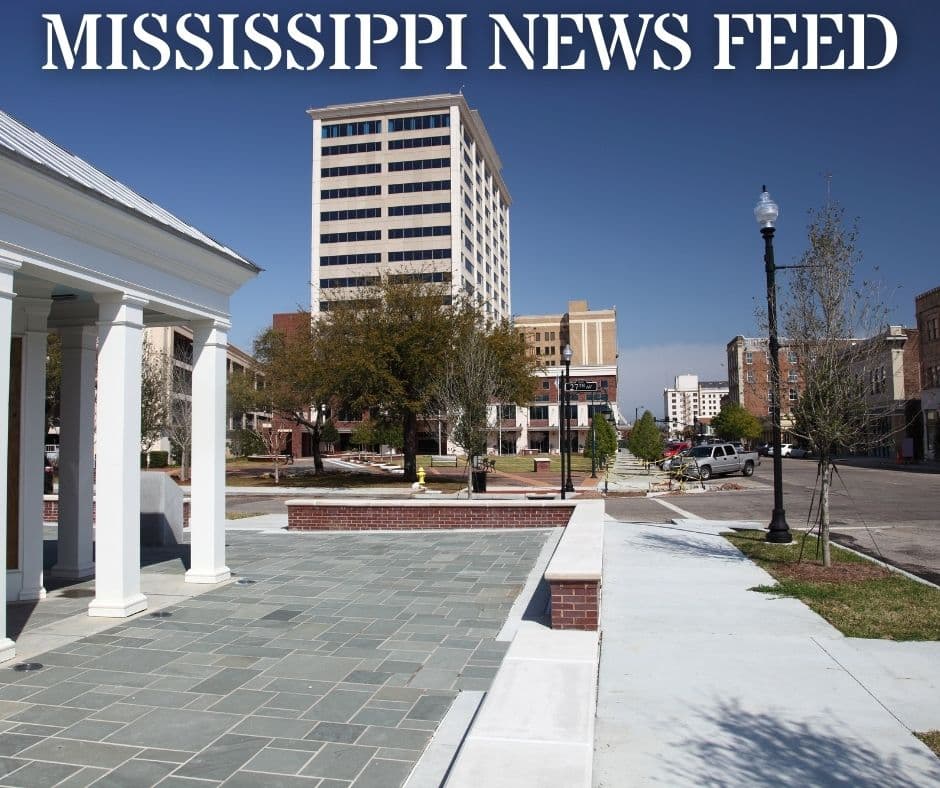
Read more about the anticipated rate changes here.
New fees will also be implemented, including a new service fee of $50, service deposit of $100, returned check fee of $25, service restoration fee of $100, and meter tampering charge of $500.
JXN Water has continued to encourage residents to use the water, with Henifin going on the record in a federal status hearing saying that the water “was safe to drink.”
More conversation regarding the billing process is expected to come at next week’s Jackson City Council meeting.
The post New water rates expected in Jackson come 2024; those who don’t pay face shut off appeared first on Magnolia Tribune.
…
By: Sarah Ulmer
Title: New water rates expected in Jackson come 2024; those who don’t pay face shut off
Sourced From: magnoliatribune.com/2023/12/15/new-water-rates-expected-in-jackson-come-2024-those-who-dont-pay-face-shut-off/?utm_source=rss&utm_medium=rss&utm_campaign=new-water-rates-expected-in-jackson-come-2024-those-who-dont-pay-face-shut-off
Published Date: Fri, 15 Dec 2023 20:00:00 +0000
-

 Local News7 days ago
Local News7 days agoCelebrate the holidays in Ocean Springs with free, festive activities for the family
-

 Kaiser Health News5 days ago
Kaiser Health News5 days agoA Closely Watched Trial Over Idaho’s Near-Total Abortion Ban Continues Tuesday
-

 Local News4 days ago
Local News4 days agoSherral’s Diner to be featured on America’s Best Restaurants
-

 Mississippi Today7 days ago
Mississippi Today7 days agoOn this day in 1972
-

 News from the South - Georgia News Feed3 days ago
News from the South - Georgia News Feed3 days agoJose Ibarra found guilty in murder of Laken Riley | FOX 5 News
-

 News from the South - Alabama News Feed4 days ago
News from the South - Alabama News Feed4 days agoTrial underway for Sheila Agee, the mother accused in deadly Home Depot shooting
-

 News from the South - Kentucky News Feed3 days ago
News from the South - Kentucky News Feed3 days agoNicholasville organization activates weather plan in response to bitter cold temperatures
-

 News from the South - Alabama News Feed3 days ago
News from the South - Alabama News Feed3 days agoAlabama's weather forecast is getting colder, and a widespread frost and freeze is likely by the …













